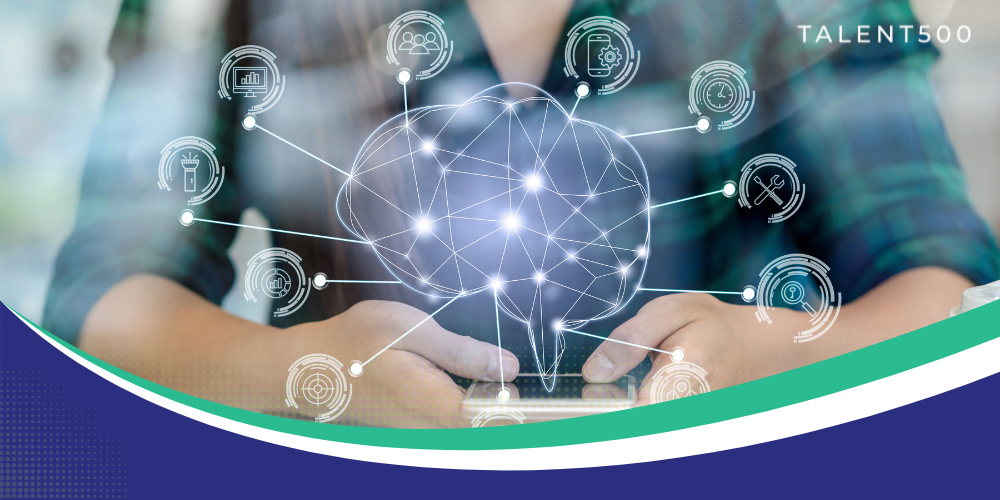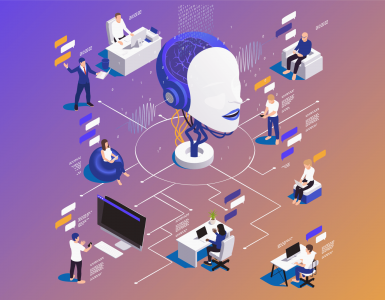We all want the best talent, who are engaged, productive, and happy. That’s easier said than done. Especially so with lean teams and even leaner budgets. We believe traditional recruitment is broken! It relies heavily on strategies that seeks out only active candidates through efforts like job fairs, seminars, newspaper ads, referrals, a few job boards and maybe intra-organizational hires.
Recruiters are often chasing two key metrics: efficiency – “how soon can the position be filled?”; and quality of hire – “how to ensure the right candidate with the right set of skills is chosen for the position?” To successfully reach these goals of scale and speed, businesses are increasingly investing in technology to transform dated processes. More than $12 billion was invested in HR tech in 2021 alone, with a larger chunk favoring Artificial Intelligence (AI) powered solutions.
The pressure on Talent Acquisition (TA) is at an all-time high. Amidst the “big quit” and the recession, business priorities have shifted to be more talent and employee-centric. More and more recruiters are relying on AI to enhance the candidate experience. And to upgrade recruitment processes to be faster and fairer.
Recruiting AI enables TA teams to discover passive candidates and unlock data-driven insights that guide decision-making and better outcomes, such as quality of hire and time to hire. According to our recent survey, as many as 60% of tech professionals are actively looking for jobs. This is where AI can bring significant change, by helping deliver the right jobs to the right talent, the right talent to the right recruiters and ultimately, build the right teams for the company.
While the hiring industry has embraced applicant tracking systems (ATSs), the challenge is that many teams still don’t fully understand how AI can help them immediately or whether it’s worth the time, money or effort.
Top 4 ways that AI can help you solve common TA challenges today:
Deep insights for informed decision making
AI can help recruiters make better decisions. It can identify the right candidates faster by leveraging machine learning algorithms to analyze thousands of data points about each candidate — including their skills, experience, education and interests — to find those who align best with your organization’s needs.
Predictive analytics allows companies to use data from past hiring experiences to predict future results, including who will accept an offer, who will stay in their job and how long they’ll stay there. Recruiters can use complex data sets to forecast which candidates are most likely to succeed on the job based on factors like performance history or education level. This insight allows recruiters to focus their efforts on the best candidates instead of spending time reviewing every application.
AI technologies are revealing recruitment blind spots by analyzing historical hiring data to identify patterns that may have previously gone unnoticed by human recruiters. It’s not uncommon for businesses to hire candidates who possess similar skills as those who’ve been successful in the past. But, you are now able to find people who had been overlooked due to them being in different industries, locations, or roles than those that companies typically look for.
AI can make hiring better, more consistent, and more efficient by reducing the risk of a bad hire and increasing retention rates through real-time feedback loops.
Automating & scaling manual tasks
AI already plays a vital role in the application process and a majority of companies use an automated Applicant Tracking System (ATS) to streamline this. ATSs screen resumes faster than humans. By using Natural Language Processing (NLP) techniques, AI can scan thousands of resumes in seconds and deliver those that match the job description. It is a time-saver and recruiters have reported that it helped them source effectively from a large pool of candidates – both active and passive profiles.
AI makes screening more effective. For example, a conversational assistant can collect data points for first level screening. Cognitive interviewing is an automated tool that uses a chatbot interface to ask interview questions based on what hiring managers want to know about a candidate’s experience and skills. This allows recruiters to get more information from their interviews faster by eliminating repetitive questions that have already been answered elsewhere in their application materials.
Automation of administrative work for improved productivity is another big advantage. Mundane tasks such as scheduling interviews, calls, and emails may hamper a recruiters ability to focus on higher-value activities like employer branding, candidate engagement and relationship building. This maximizes productivity and thereby cuts down time-to-hire. AI solutions can deal with this issue, absorbing these responsibilities with ease. By unloading mundane work, employees have more time to dedicate to core tasks.
Overcoming human biases
Unconscious biases are often responsible for companies struggling to attract and hire diverse candidates. These biases often enter the system through training data that algorithms use to make decisions. For example, if your company hires mostly white males, then the AI will learn that bias and will continue to hire them at a higher rate than other candidates. Or it may be able to detect that your ATS is giving preference to candidates who went to Ivy League schools over other applicants with exactly similar skills and experience due to unconscious bias among recruiters who use it as part of their hiring process.
This is why it is imperative to perform regular audits. These help recruiters pick up on problems that hinder the algorithm’s ability to procure desired results. Bias detection frameworks use machine learning algorithms to analyze how well an AI system makes decisions based on race, gender and other factors like historical patterns. The results of this analysis can be used to train the AI system to adjust its decision-making process to avoid discriminatory outcomes. In addition, these tools allow organizations to monitor their AI systems regularly for potential bias problems before they become visible externally.
AI has the potential to transform the recruitment process and make it more inclusive and transparent. It can hire objectively without unconscious bias against women, minorities, and older workers; and hire the best person for the position without stereotypes interfering.
Enhancing candidate experience with personalization
AI can help keep candidates engaged throughout the process. 85% of professionals think that delays in communication of next steps is the biggest challenge in their current hiring process. AI allows you to automate messages that are still customized, and send them periodically according to each step of the process.
AI can also offer more meaningful conversations and discussions. Historically, communication has relied on non-verbal cues such as body language and expression. As such, the meaning and depth of an interaction are often lost in translation when communicating virtually. Fortunately, AI tools were able to deliver a solution in this regard. By analyzing text, programs can now assist employees in decoding communication, offering clarity on the tone of the conversation. This helps reduce miscommunication amongst stakeholders. Some AI tools can also help gauge an employees’ morale and engagement with the help of language and sentiment analysis.
And finally, AI solutions can provide opportunities to train new joiners and employees efficiently.
AI programs and tools can not only assess productivity but also determine an employee’s strengths and weaknesses. From there, personalized training programs can be offered to promote targeted upskilling. This helps employees expand their skill set and improve their quality of work. This type of training can ease the onboarding process and also prepare employees for job enlargement. Organizations that invest in training directly increase their intellectual capital, of which more is always better.
AI is already augmenting recruiting at leading companies across a range of industries. As a TA leader, it will enable you to focus your time on the people aspects of recruitment, which are by far the most valuable. Connect with us to discover what AI can do for you and your business. Set up a consultation with our team here.






Add comment